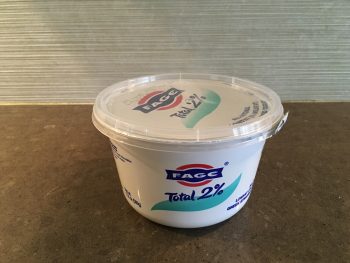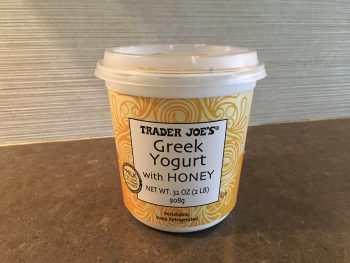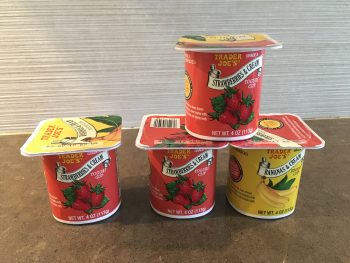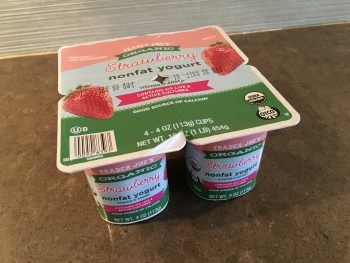
Over 50% of French people eat yoghurt every day. In contrast, only 20% of Americans eat yoghurt daily, preferably Greek yoghurt and usually for breakfast. I didn’t expect such a difference in eating habits when it came to yoghurt.
Last December, I shared this video about how French people enjoy an enormous selection of dairy products. Historically a large producer, France is now the world’s sixth largest agricultural hub. Dairy farms are concentrated in Western France, where I was born and raised. Perhaps this is why I’m a heavy user of cheese, yoghurt, and other dairy products.
When I moved to the States, I thought I would more or less find the same food I was used to in Europe (e.g. meat, fruits and vegetables, dairy). Yes, America has meat, fruits, and dairy, but American milk is sold by the gallon, and yoghurt tastes different here than it does in France. I found this all the more surprising because French yoghurt brands Dannon and Yoplait are available in most American grocery stores.
The French love to complain about food, especially yoghurt
Many French expats in the US commented on an article by French Morning article (a web magazine) to express their feelings about American yoghurt. I have nothing to add to these comments:
“I expected more choice in the supermarkets, and the flavors are very limited,” wrote Karine.
Julian complained,
“I don’t get it. Why do they put gelatin in all their yoghurts? I’m not sure if this is the reason why they taste so artificial, but whatever it is, I don’t like it.“
Jihel was the harshest in her criticism:
“Yoghurts in the US are quite crappy. When I come back to France, I could buy everything in the dairy department!“
Why is French yoghurt so different from American?
First of all, it’s cultural! Only 20% of Americans eat yoghurt every day, while over 50% of French people do. French children get used to yoghurt as babies and toddlers, while American kids start later. At the same time, Americans prefer to eat it for breakfast or as a meal. In France, 83% of people eat yoghurt for dessert.
Of course, this has an impact on recipes. American yoghurts are richer in protein since they can be a meal replacement. Chobani’s R&D manager explained in the cited article that Greek yoghurts are protein-loaded and provide a long-lasting, full feeling. This type of yoghurt requires three time more milk compared to normal yoghurt. Today, Greek yoghurt accounts for 52% of the yoghurt sales in America.
For my French fellows and myself, American yoghurt is too sweet. Besides the fact that Americans put a lot of sugar in food, I found another logical explanation for this phenomenon. Yoghurts are naturally a bit sour due to bacterial fermentation in milk. When you don’t get used to it early, the sour taste is not pleasant. For this reason, many American yoghurts contains sugar, honey, cream, and fruit to balance out the sourness.
It’s also logical that the size of the container differs. In France, a yoghurt weighs only 125g (or 4.4oz), which is really fine for a dessert. In America, most individual yoghurts weigh 150g (5.3oz).
A perspective for the American market
By comparing the consumption per capita between different countries, it is clear that the US has real growth potential. According to Statista.de, each year French people eat around 21kg of yoghurt, but Americans eat under 7kg. Just imagine how much this average would increase if American toddlers started eating yoghurt!
The market in France is different. French supermarkets enjoy a large selection of desserts, fromage blanc, and yoghurt, and the latter has only a small share of the shelves. If you want to see what a dairy department looks like in France, I invite you to join my YouTube Channel for more videos.
After trying many American yoghurt brands, FAGE is my family’s favorite. We only eat yoghurt several times a week. During the summer, I’ll mix plain yoghurt with strawberries or raspberries. During the winter, my kids enjoy yoghurt with honey and rice crispies.

Sometimes, I buy the whole milk yoghurt from Trader Joe’s. This brand is very creamy and almost fat, as part of the recipe involves added cream. For us, it’s too much after a complete meal.



Some final thoughts
Two years ago, I bought a yoghurt-maker. Now and then, my daughter will ask me when I intend to make our own yoghurt. Somehow, I got used to American yoghurts. I’m happy with Fage, and since I can find them in every supermarket, my motivation to make yoghurt from scratch is not high. I’ll you keep you posted if I change my mind!


One big difference is that French yogurt are the most part made with whole milk. Here in the US yogurt are made with 2% or 0% milk, then gelatin is added to thicken it, there goes the taste !!!
My French wife and I (American) just had a fight about yogurt in the USA. We generally buy plain full fat Stoney Brooke yogurt, and add sugar or maple sugar, perhaps fruit or cereal as well.
The problem is that if we wanted to buy the single serve containers that are flavored, that they would be too sweet, this training our children to love sweets and this leading them down into a world of diabetes and obesity.
I, on the other hand, feel that while there may be a slight difference in sweetness between good French and American flavored yogurt, it won’t hurt our children. It would also make packing lunches simpler instead of having to mix our own yogurt and clean the container.
It all depends on how often you compromise. Because not only yogurts are very sweet, sodas, ice cream etc are also. You can find sugar even in bread. So, let’s say I side with yr wife for this one
I love the variety of French yogurt. The selection is top notch, but I only eat it every now and then. It’s definitely not a daily food for me. Last time I was in the US, though, I was so impressed by my local Walmart’s yogurt selection. There were so many organic varieties and Greek yogurt styles from Iceland and other “specialty” yogurts. Some do have 15g+ of sugar per serving (same as in France, many yogurts are packed full of sugar), but there were many reasonable options that tasted great and weren’t as sweet as candy!
I should really go more frequently to Walmart. The next one is in DC and pretty small. I wasn’t thrilled last time I shopped there.
Thank you for sharing Diane!